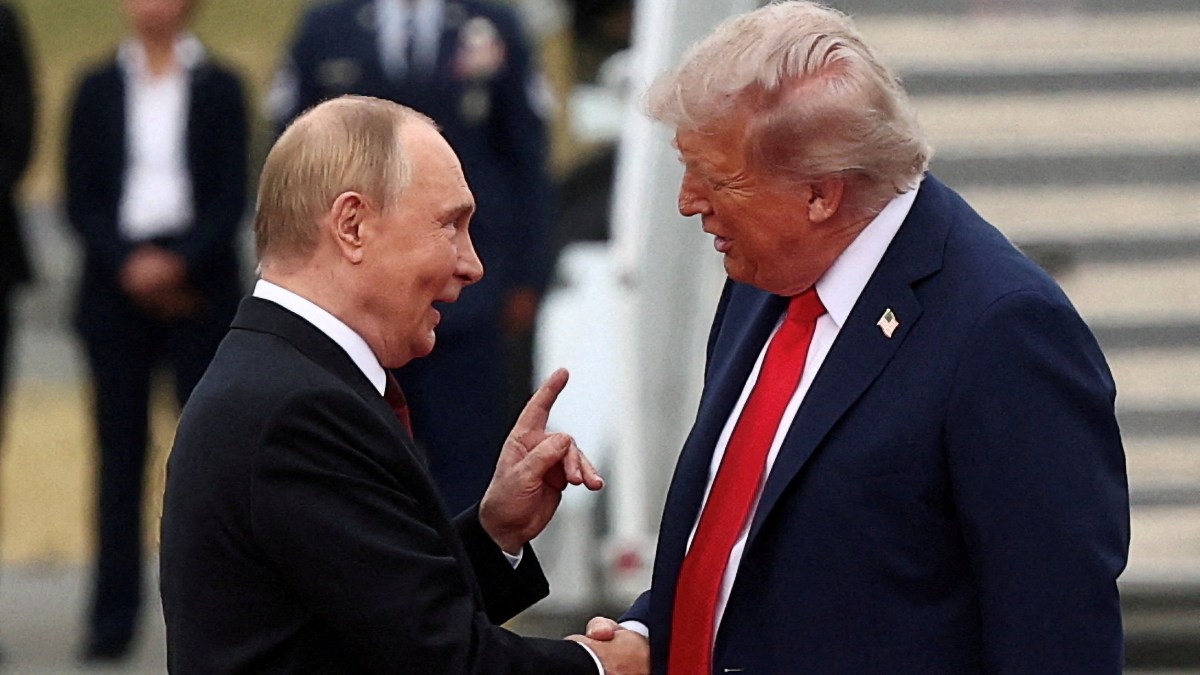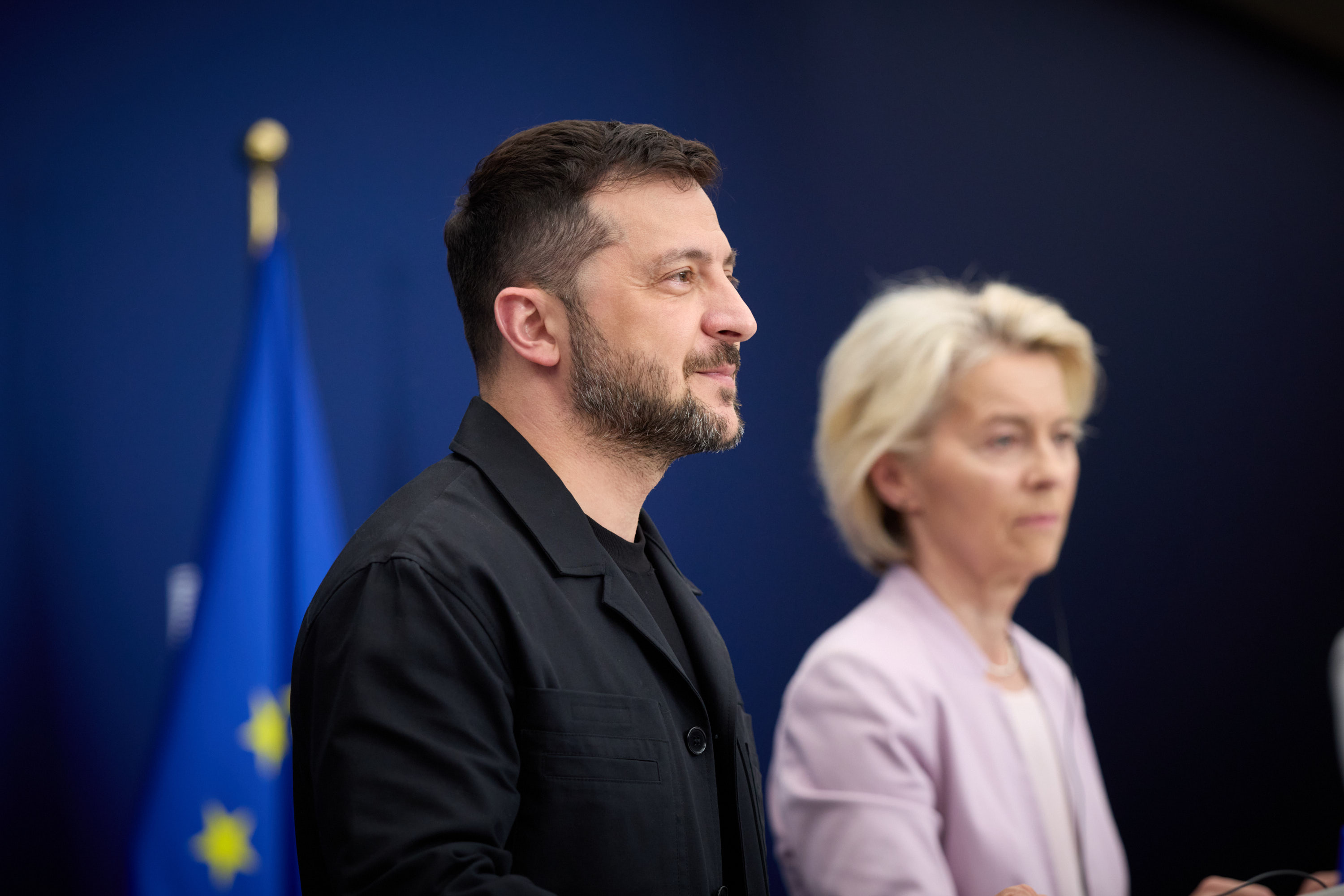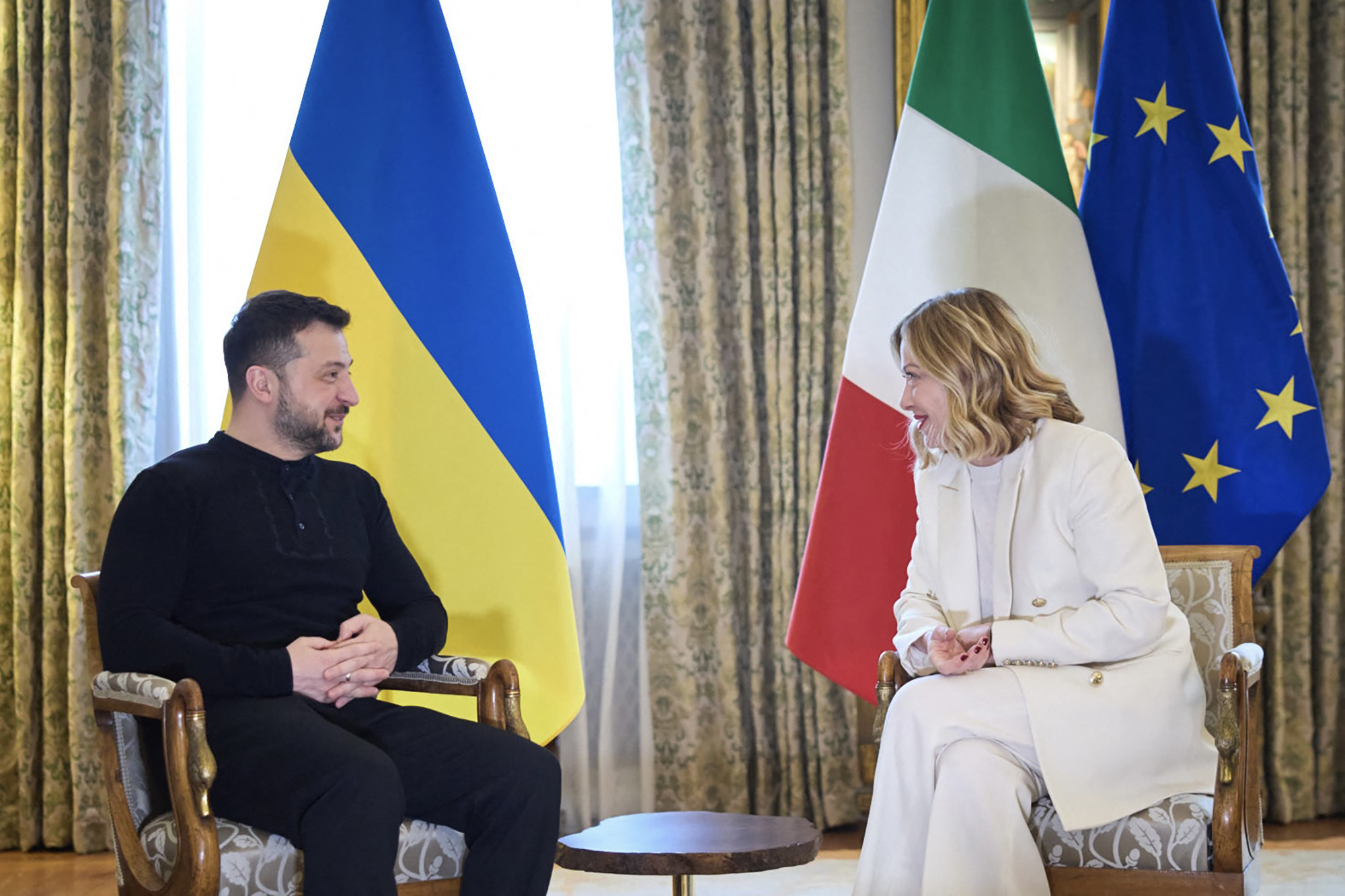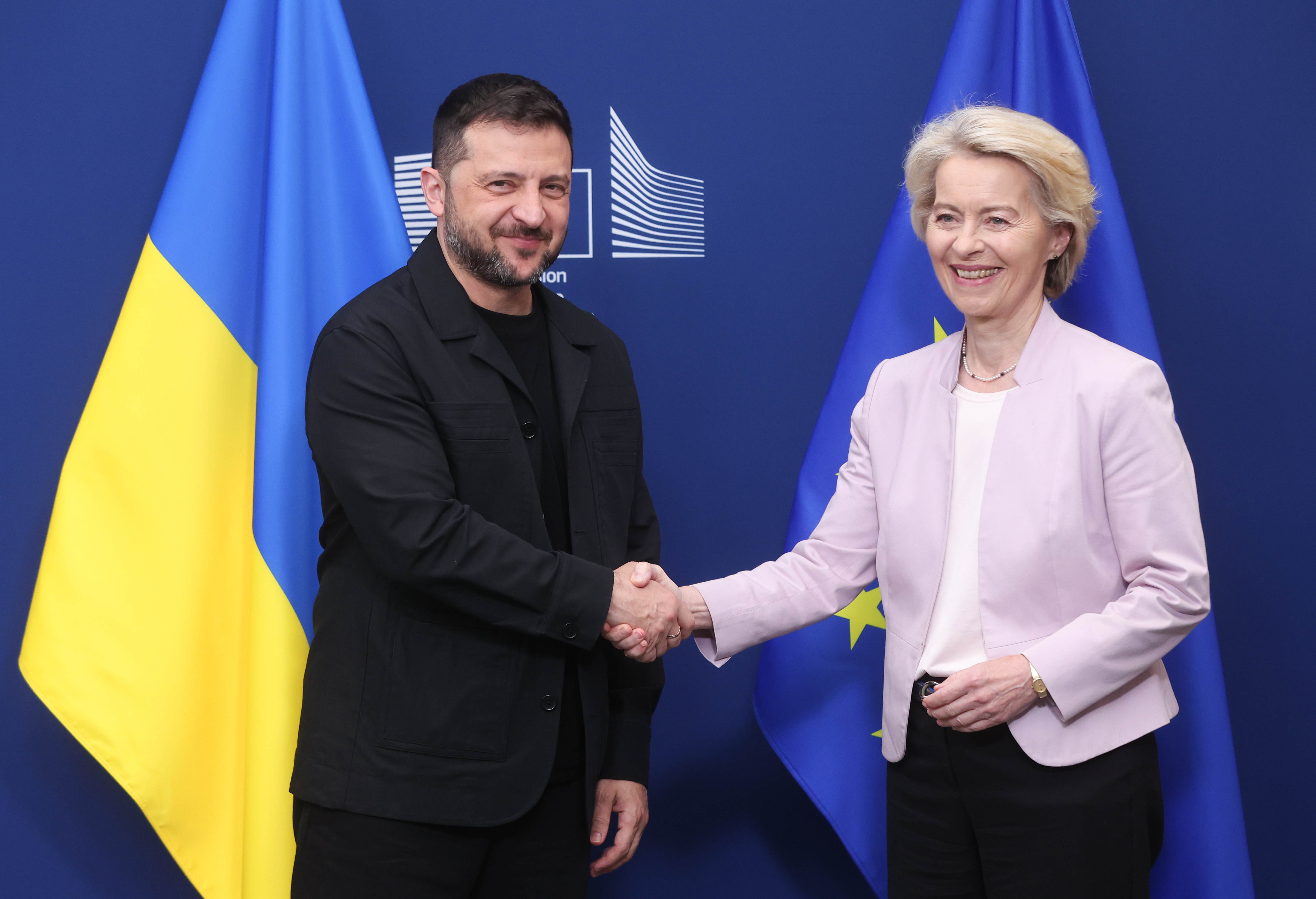The prime minister has told European allies that discussions on the future of Ukraine must involve President Zelensky, it is understood.
Sir Keir Starmer, who co-chaired a video call of the “coalition of the willing” on Sunday, delivered opening remarks alongside President Macron.
European allies continue to be unified, Starmer is understood to have said, before updating attendees on commitments from President Trump on providing security guarantees to Ukraine.
Starmer said negotiations on Ukraine’s future must involve its president, as discussion turned to European leaders’ plans to travel to the White House on Monday to meet Trump and Zelensky.
He said the coalition’s military planning was at an advanced stage and emphasised the importance of further financial sanctions on the Kremlin.
President Macron said that the goal of Monday’s meeting was for Europe to show unity with Ukraine and that the continent must be at the table in any discussion over the war.
After Sunday’s meeting of the “coalition of the willing”, he said: “If we show weakness today in front of Russia, we are laying the ground for future conflicts.”
Petr Fiala, the prime minister of the Czech Republic, wrote on X: “The videoconference of the Coalition of the Willing was important for coordination ahead of tomorrow’s meeting at the White House.
“We agreed that the immediate priority must be to bring an end to the killing, and that clear security guarantees for Ukraine from the United States and Europe will be absolutely essential for further negotiations.”
President Zelensky said there was “clear support for Ukraine’s independence and sovereignty” and that “everyone” in the coalition of the willing agreed that “state borders must not be changed by force”.
The Ukrainian president said: “Everyone supports that key issues should be resolved with Ukraine’s participation in a trilateral format: Ukraine, the US and the Russian leader.”
He said on X: “This is a historic decision that the United States is ready to participate in security guarantees for Ukraine. The security guarantees resulting from our joint work must be truly practical and provide protection on land, in the air and at sea, and they must also be developed with Europe’s participation.
“Of course, we discussed how to stop the killings as soon as possible. We are working on a shared vision of what a peace agreement should look like — truly fair, swift and effective.”
Zelensky added a photograph of himself and Ursula von der Leyen, the European Commission president, to his post.
European leaders have concluded their virtual meeting of the “coalition of the willing”.
The EU Commission said the leaders had “reaffirmed their unity in supporting Ukraine towards a just and lasting peace”.
President Stubb of Finland wrote on X: “Today, I participated in a meeting of heads of state and government from the coalition of the willing in support of Ukraine. There is a strong consensus among the coalition countries on the need to continue supporting Ukraine. Europe and the United States are further strengthening their common position. We will continue our joint efforts with Ukraine, our European colleagues, and the United States tomorrow in Washington.”
Antonio Costa, the president of the European Council, added on X: “Unity between Europe and the United States is vital for getting a sustainable peace for Ukraine. As I underlined during today’s meeting of the Coalition of the Willing, if no ceasefire is agreed, the EU and the U.S. must increase pressure on Russia.”
Mike Pence, the former US vice-president, has urged President Trump to set in train additional sanctions on Russia during his talks on Monday with European leaders and President Zelensky.
“I know his style in dealing with these dictators,” Pence told CNN. “It’s the velvet glove. But I think the hammer needs to come and it needs to come immediately.”
While the European leaders gather at the White House, Trump should “pick up the phone and ask [the Senate] majority leader, John Thune, to immediately pass the secondary sanctions bill that is supported by virtually everyone in the US Senate,” he said. It would “make it clear to Putin that we are prepared to take actions that would literally break his economy,” he added.
Marco Rubio, the US secretary of state
KEVIN LAMARQUE/REUTERS
Marco Rubio, the US secretary of state, on Sunday warned of “consequences”, including the potential imposition of new sanctions on Russia, if no peace deal was reached.
“If we’re not going to be able to reach an agreement here at any point, then there are going to be consequences,” he told US broadcaster NBC. “Not only the consequences of the war continuing, but the consequences of all those sanctions continuing and potentially new sanctions on top of it as well,” he said.
President Zelensky was asked to leave the Oval Office after a disastrous argument with President Trump and his vice-president, JD Vance, on February 28
Marco Rubio, the US secretary of state, said both Russia and Ukraine would need to make concessions to achieve peace. However, he suggested President Putin would have to accept that security alliances would be in place.
“The one thing we do know that Ukraine has said repeatedly and publicly talked about is security guarantees,” he told ABC News. “They need to be able to enter into security guarantees that ensure that this is never going to happen again, that they’re not going to get re-invaded in two and a half or three years or four years or whenever it may be … They want to be able to go on to rebuild their country and live their lives.
“That’s a very reasonable request. That’s something we’re working on. And that’s something the Russian side has to understand, obviously, is that, as a sovereign country, Ukraine has a right, like every sovereign country, to enter into security alliances and agreements with other countries. These are some of the things that we’ll be discussing.”
Ursula von der Leyen and President Trump in Scotland in July
EVELYN HOCKSTEIN/REUTERS
Europeans have highlighted President Trump’s new support for a Nato-style mutual defence clause with Ukraine to underpin any new peace agreement.
The US president briefed European leaders on the idea on Saturday, but ruled out US troops and failed to specify what sort of support would be given.
Ursula von der Leyen, the European Commission president, echoed comments from Berlin and Rome welcoming the proposal, which has been compared to Nato’s Article 5, as the sole point of European consensus with Trump after his meeting with President Putin on Friday.
She said: “We welcome President Trump’s willingness to contribute to Article 5-like security guarantees for Ukraine, and the coalition of the willing, including the European Union, is ready to do its share.”
Moscow has made “some concessions” with regard to Ukraine’s five regions occupied by Russia, President Trump’s special envoy, Steve Witkoff, has said.
He also said and that Trump and President Putin agreed to “robust security guarantees” in their talks in Alaska on Friday.
His comments follow Trump posting on his Truth Social platform: “BIG PROGRESS ON RUSSIA. STAY TUNED! President DJT” without giving further details.
The US secretary of state, Marco Rubio, gave a contrasting message when speaking on America’s morning shows, saying that it may not be possible for the US to create a scenario to end the war.
President Zelensky has repeated his call for a ceasefire as a precondition for peace talks.
The Ukrainian president said it was impossible to review the situation under the pressure of fighting, so a ceasefire was needed to work quickly on a final deal.
“Putin has many demands. We do not know all of them, and if there are really as many as we heard, then it will take time to go through them all. It’s impossible to do this under the pressure of weapons, so it’s necessary to cease fire and work quickly on a final deal.” As a result, “real negotiations” that start where the front line currently stands are necessary, he added.
Zelensky stressed that the Ukrainian constitution makes it impossible to give up territory. This should only be discussed by the leaders of Ukraine and Russia at a trilateral summit, he said.
Russia will face “additional consequences” if it does not agree to a ceasefire, President Trump’s national security adviser has said.
Marco Rubio, the US secretary of state, said Trump had not changed his mind over punishing President Putin if no agreement was reached on a ceasefire. “I don’t think his mind has changed at all. I think, ultimately, if this whole effort doesn’t work out, then there is going to have to be additional consequences to Russia,” Rubio told ABC News. “But we’re trying to avoid that by reaching a peace agreement. And that’s not going to be easy. It’s going to take a lot of work.”
Rubio said that “obviously, in order for us to get a peace agreement, Ukraine has to be a part of it” but he said “there remains some big areas of disagreement”, adding: “So, we’re still a long ways off. I mean, we’re not at the precipice of a peace agreement. We’re not at the edge of one. But I do think progress was made.”
President Zelensky has thanked the EU for the support shown to Ukraine since the war began in 2022.
He said it was important that they speak and that “Washington is with us”, adding: “This unity helps reach real peace.”
Europeans will insist that Ukraine’s armed forces must not be capped or limited under any Trump peace plan or talks with Russia.
Ursula von der Leyen, the European Commission president, highlighted key red lines, and potential flashpoints, for European governments in the run-up to talks in Washington on Monday.
Von der Leyen said that Europe would refuse to accept any limits on Ukraine’s armed forces or outside military assistance. “We must have strong security guarantees to protect both Ukraine and Europe’s vital security interests. Ukraine must be able to uphold its sovereignty and its territorial integrity,” she said.
“There can be no limitations on Ukrainian armed forces: be it co-operation with other countries or assistance from other countries. No limitations for the Ukrainian armed forces,” she said before the conference call with European leaders on Sunday. “Ukraine must become a steel porcupine, indigestible for potential invaders.”
President Trump dropped his demands for a ceasefire about two hours into his meeting with President Putin, according to the New York Post, which cited an anonymous source.
“Figuratively, the president sort of threw up his hands and said, ‘I’m not interested in a ceasefire any more’,” the source said.
Trump was concerned that there would immediately be questions about how long any ceasefire would last and whether Russia was going to rearm, according to the paper. The source claimed that “the president got Putin to say out loud and agree to, in some way, memorialise that … ‘I will not attack a European country’”.
President Putin briefed his close ally, President Lukashenko of Belarus, on Sunday about the talks in Alaska, and also spoke to President Tokayev of Kazakhstan.
The Russian foreign minister, Sergei Lavrov, held calls on Saturday with his Turkish and Hungarian counterparts.
Hungary has been a hold-out in the EU against the bloc’s efforts to isolate Putin since the start of Russia’s full-scale invasion of Ukraine in February 2022. Turkey has tried to maintain open diplomatic channels with both Ukraine and Russia.
President Zelensky and Giorgia Meloni in March
AFP
Tom Kington, Rome
The Italian prime minister, Giorgia Meloni, will have her work cut out in Washington — staying loyal to President Zelensky, while showing support for President Trump.
After the Trump-Putin summit, the firmly pro-US Italian leader said: “I consider it positive that chances for peace in Ukraine are emerging. The deal is still complicated but finally possible.” She added: “Only Ukraine can negotiate about conditions and about its territory.”
Meloni claimed the “most interesting” development in Anchorage was Trump’s adoption of an idea Meloni said was hatched by Italy to offer Ukraine security guarantees similar to Nato’s Article 5, even though Ukraine is not a Nato member.
The European Commission president Ursula von der Leyen welcomed the Ukrainian president at the EU Commission’s head office in Brussels on Sunday.
Von der Leyen and Zelensky are due to hold a joint news conference later on.
Charles Bremner, Paris
President Macron, who has a far older relationship with President Trump than the other European leaders, is hoping to deploy the good chemistry he believes that he has created with the US president since he first won office in 2017.
Macron in the Oval Office in February
CHIP SOMODEVILLA/GETTY IMAGES
Macron wants to sway Trump away from his bedazzlement by President Putin, warning that the Russian leader cannot be trusted a millimetre, French diplomats say. French officials were privately appalled by what they see as Trump’s unconditional surrender to Putin’s positions at the Anchorage meeting.
Publicly, however, the French say they support Trump’s aims of achieving a Ukraine settlement while standing firm, with the Europeans, behind Kyiv and demanding fierce security guarantees.
Macron is aware that needling Trump is counterproductive. Trump put down the French president on his Truth Social platform in June, saying “Emanuel always gets it wrong”, after the French president claimed that Trump left the G7 Summit in Canada early to work on a ceasefire between Israel and Iran.
President Zelensky has accused Russia of obstructing talks. In a post on X on Sunday morning, the Ukrainian president said: “We see that Russia rebuffs numerous calls for a ceasefire and has not yet determined when it will stop the killing. This complicates the situation.”
He added: “If they lack the will to carry out a simple order to stop the strikes, it may take a lot of effort to get Russia to have the will to implement far greater, peaceful coexistence with its neighbours for decades. But together we are working for peace and security. Stopping the killing is a key element of stopping the war.”
Downing Street said Sunday afternoon’s call between the “coalition of the willing” would focus on security guarantees.
No 10 said the meeting, which is being co-chaired by Sir Keir Starmer, would “discuss the progress to provide Ukraine with robust security guarantees in the event of any deal”.
The prime minister and European leaders have appeared increasingly confident that President Trump will offer a “security guarantee” of air support to back up allied troops on the ground in Ukraine, should they be deployed to keep the peace.
European leaders have deep reservations over what has emerged from President Trump’s meeting with President Putin on Friday, but are encouraged that the US president briefed Friedrich Merz, Giorgia Meloni and others that he would support a “non-Nato Article 5-type guarantee” for Ukraine if a peace agreement is reached.
Merz, the German chancellor, has pitched his “willingness to assume responsibility” and offered a European venue, as yet unnamed, to host a possible summit with Trump, Putin and President Zelensky next week.
“I think that such a three-way meeting will take place,” Merz said on German television on Sunday. ”The date and place are still to be worked out. We have proposed that a place could be found in Europe.”
According to diplomatic sources, Zelensky convinced European leaders to accompany him to Washington to lend “moral support and solidarity” in the White House.
Germany’s chancellor was the first head of a European government to confirm he had accepted the invitation. A statement from Berlin stressed “Germany’s interest in a swift peace agreement in Ukraine”, adding: “The talks will address, among other things, security guarantees, territorial issues, and continued support for Ukraine in its defence against Russian aggression.”
Trump is pushing for a quick deal after his meeting with President Putin in Alaska on Friday.







